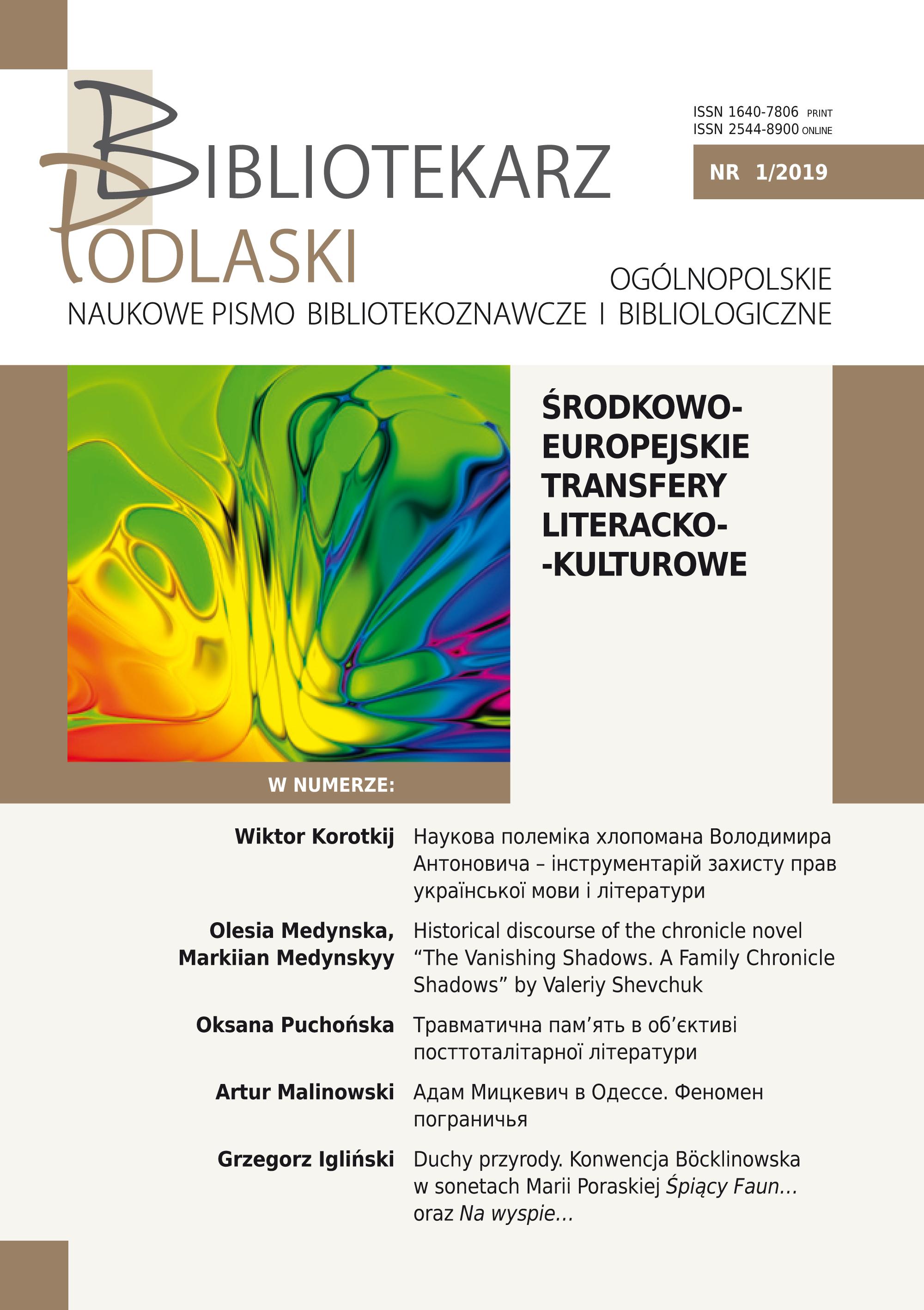Abstract
The article presents a study of the historical foundations of the chronicle novel ”The Vanishing Shadows. A Family Chronicle” by Valeriy Shevchuk. The attention is focused on the writer’s interpretation of historical events in the late 18th century. The social and ideological, discursive processes of the reproduced historical period are analyzed. An integral perception of the history of our country is presented in an inseparable connection between the past and the present. The critical moments in Ukrainian history were outlined as the background against which some urgent, vital problems of either a single individual or the whole ethnic group were shown. Particular characters are correlated with the historical figures, with historical truth being confirmed both indetails and in the general picture of represented reality. Special stress is placed on the artistic depiction of intrinsic motives of the members of the ancient noble family of Temnytskyi. The article discusses the issues of nation-building in the context of social destruction and imperial enslavement. We also propose a new paradigm of human spiritual existence that was inspired by Schevchuk’s work, and explore the ideas of national self-identification as a spiritual rather than caste community, and of the quest for national unity embarked on by intelligentsia as the leader of the nation.
References
Andrusiv S., Modus nacionalnoyi identychnosti: Lvivskyj tekst 30-x rokiv XX st., Lvivskyj nacionalnyj universytet imeni Ivana Franka, Dzhura, Lviv, Ternopil 2000.
Berdyayev M., Nacionalnist i lyudstvo, „Suchasnist” 1993, Issue 8-9, s. 148-156.
Kostomarov M., Dve russkye narodnosty, „Osnova” 1861, Issue 3, s. 61-83.
Luczkyj Yu., Mizh Gogolem i Shevchenkom, Chas, Kyyiv 1998.
Lysyak-Rudnyczkyj I., Istorychni ese: u 2 t., Osnovy, Kyyiv 1994, vol. 1.
Mala encyklopediya etnoderzhavoznavstva, ed. by I. Rymarenkо, Geneza, Kyyiv 1996, s. 87-92.
Ryabchuk M., Knyga dobra i zla za Valeriyem Shevchukom, „Vitchyzna” 1988, issue 2, s. 76-179.
Saunders D., Ukrayinskyj vplyv na rosijsku kulturu 1750–1850, UVU, Edmonton 1985.
Shevchuk V., Mali ukrayinski litopysy, xroniky ta diariushi, “Kyyivska starovyna” 1993, Issue 6, s. 17-20.
Shevchuk V., Muza Roksolanska: u 2 kn., Lybid, Kyyiv 2005, kn. 2.
Shevchuk V., Nerozgadani tayemnyci «Istoriyi Rusiv», „Istoriya Rusiv”, Veselka, Kyyiv 2001, s. 7-51.
Shevchuk V., Tini znykomi. Simejna xronika, Tempora, Kyyiv 2002.
Slaboshpyczkyj M., Mozhlyvosti «vyspovidalnogo» j eksperymentalnogo pysma, „Literaturni profili: Literaturno-krytychni narysy”, Ukrayinskyj pysmennyk, Kyyiv 1984, s. 197-216.
Subtelnyj O., Ukrayina: Istoriya, Lybid, Kyyiv 1993.
Articles published in the “gold open access” mode on the basis of a non-exclusive license agreement between the publisher and the author. Permitted use:
- the publication may be read and stored on any device,
- the publication may be cited (with obligatory reference to the author, the title of the text, as well as the full title, bibliographic address of the issue and page of the journal)
The editorial team of “Bibliotekarz Podlaski” implements an open access policy by publishing materials in the form of the so-called Gold Open Access. From volume 42 (issue 1/2019), the journal is available under the Creative Commons license (Attribution – ShareAlike: CC BY-SA).
The key declarations of the Open Access and Open Science movement, which we fully support, are available on the CEON Open Science website.
COPYRIGHT:
The editorial team of “Bibliotekarz Podlaski” implements an open access policy by publishing materials in the form of the so-called Gold Open Access. The journal is available under the Creative Commons license – Attribution – ShareAlike 4.0: International: CC BY-SA 4.0).
The key declarations of the Open Access and Open Science movement, which we fully support, are available on the CEON Open Science website.
“Bibliotekarz Podlaski” allows its readers to read, download, copy, distribute, print, search and link to the full content of articles. We enable full, immediate, unlimited (both in a territorial, temporal and technical sense) open access to all published content, in accordance with the principle that freely available research increases and accelerates the global development of science and the exchange of knowledge.
The editorial team of “Bibliotekarz Podlaski” encourages authors to place articles published in the journal in open repositories (after the review or the final version of the publisher), provided that a link to the journal’s website is provided.
The journal does not charge the authors any fees for accepting and publishing their texts.


